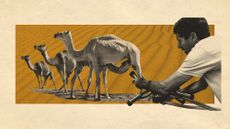Should history's greats be held to today's standards of offense?
The trouble with reassessing history's heroes


Twitter's teapot held a new tempest Sunday, this one brewing over astronaut Scott Kelly's approving quote of Winston Churchill. Within half a day, buffeted by digital waves of outrage, Kelly retracted his words, tweeting that he did "not mean to offend by quoting Churchill" and pledging to educate himself "further on his atrocities."
Was Churchill a "grotesque racist and a stubborn imperialist, forever on the wrong side of history" — or a stalwart defender of freedom against the evil of Nazism, a man prone to the errors of his age but admirable nevertheless? The same historical record undergirds both assessments, and their divergence raises questions larger than Churchill's legacy alone: Should history's greats be held to today's standards of offense? Is the past to be interpreted via the present's ethical lens? If we know something to be wrong now, can we blame our ancestors for failing to know it then?
Christopher Columbus, whose federal holiday fell on Monday, was weighed and found very much wanting (eyewitness accounts and the man's own journals detail unspeakable cruelty). But what about the more complicated cases?
Subscribe to The Week
Escape your echo chamber. Get the facts behind the news, plus analysis from multiple perspectives.

Sign up for The Week's Free Newsletters
From our morning news briefing to a weekly Good News Newsletter, get the best of The Week delivered directly to your inbox.
From our morning news briefing to a weekly Good News Newsletter, get the best of The Week delivered directly to your inbox.
Should we honor someone like Thomas Jefferson, the slave-owning advocate of universal human rights? What do we make of Martin Luther King, Jr.'s alleged infidelity and plagiarism? Or Martin Luther's gross antisemitism, or the rank sexism rampant among classic philosophers and theologians? Or — well, you can find any number of lists of other important historical figures who don't conform to the present-day ethical consensus.
Your fave, as they say, is problematic. Should they, on that count, cease to be your fave?
I've been thinking about this lately because I'm reading How the Other Half Lives, a groundbreaking book on the slum conditions of late 19th century Manhattan. When Jacob A. Riis published this brief work in 1890, it was enormously influential, drawing concern to the plight of New Yorkers in extreme poverty. Riis arranged slideshows of photos of tenement life, an introductory note to my copy says, and "newspapers reported that his viewers moaned, shuddered, fainted, even talked to the photographs he presented." Riis is memorialized around New York City to this day, and his book receives prominent display in New York City's excellent Tenement Museum.
Riis' book is also super racist.
In his very effort to humanize the poor of lower Manhattan for the upper classes, Riis engages in horribly dehumanizing stereotypes. Italians, in his telling, may be too stupid to learn English, and the men lounge while women toil. Jews, by contrast, are somehow judged to be too industrious, critiqued for doing what they must to pay the rent in a book dedicated to demonstrating the rent is too damn high. Riis' harshest words may be reserved for Chinese immigrants, whom he deems greedy, spiritually incapable, and a danger to white womanhood.
How the Other Half Lives is a landmark work of journalism and a powerful call to care for the poor. It afflicts the comfortable and comforts the afflicted. But it afflicts the afflicted, too, with a blatant racial hierarchy most would easily, and rightly, reject today. Riis arguably exceeded the ethical standards of his own time, but in this regard he falls gravely short of ours. As Riis himself wrote, to "a certain extent, we are all creatures of the conditions that surround us, physically and morally. But is [that] knowledge reassuring?"
Adding to the ambiguity in these messy historical cases is the way in which our political tribes seem to have mysteriously swapped places. If you'll permit a little generalization of my own, from the right we often hear talk of preserving moral absolutes across centuries — until a revered historical figure must be defended from unfair modern attacks. And from the left there's an attention to situated perspectives and the nuance of cultural context — until some hoary old racist needs to be condemned.
Perhaps you're familiar with moral foundations theory, a social psychology framework that posits varying commitment to six moral foundations — care, liberty, fairness, loyalty, authority, and purity — as a basis for diverging political perspectives. Under normal circumstances, the right puts more emphasis on purity and the left on fairness. When assessing flawed historical figures, however, they seem to switch. Is this hypocrisy, competitive "virtue signaling" for different audiences? Or sincere disagreement on a sincerely debatable quandary?
I can't pretend to offer any clear-cut rules or answers, only a few guidelines. As I've written elsewhere, we might first consider the nature of the historical contribution for which the figure under consideration is best known: Do we primarily remember them despite their sins or because of them? If the former, we may continue to honor and learn from the good while refusing to ignore or minimize the bad.
This is not the simple separation of art and artist some have proposed, nor is it a concession to lesser moral codes. It is more a recognition that art and artist alike may be a mixed bag, that it is possible to have brilliant insight and deplorable blindspots at the same time.
Second, we can take a closer look at the historical era in question, where we may discover more righteous voices were crying in the wilderness. Support for slavery can't be downplayed as an inevitable assumption of a past age if abolitionism was already afoot. Conversely, we may find some unsatisfactory ethic came from a positive, if incomplete, moral trajectory. That direction of movement deserves recognition, even if we are farther along.
Third, how closely are this person's failings connected to the way in which we want to honor them now? For instance, a statue of President Franklin Delano Roosevelt could be quite fitting at a polio treatment facility and wildly inappropriate in San Francisco's Japantown neighborhood.
And finally, we should examine the extent to which our own biases are in play. This means noticing whether our own leanings and loyalties have led us to dismiss past misdeeds for our political convenience — or whether we've applied anachronistic ethical standards precisely because we want to bench the other team's star player. We too are "creatures of the conditions that surround us," as our descendants will know all too well.
Create an account with the same email registered to your subscription to unlock access.
Sign up for Today's Best Articles in your inbox
A free daily email with the biggest news stories of the day – and the best features from TheWeek.com
Bonnie Kristian was a deputy editor and acting editor-in-chief of TheWeek.com. She is a columnist at Christianity Today and author of Untrustworthy: The Knowledge Crisis Breaking Our Brains, Polluting Our Politics, and Corrupting Christian Community (forthcoming 2022) and A Flexible Faith: Rethinking What It Means to Follow Jesus Today (2018). Her writing has also appeared at Time Magazine, CNN, USA Today, Newsweek, the Los Angeles Times, and The American Conservative, among other outlets.
-
 The growing thirst for camel milk
The growing thirst for camel milkUnder the radar Climate change and health-conscious consumers are pushing demand for nutrient-rich product – and the growth of industrialised farming
By Harriet Marsden, The Week UK Published
-
 'Good riddance to the televised presidential debate'
'Good riddance to the televised presidential debate'Instant Opinion Opinion, comment and editorials of the day
By Harold Maass, The Week US Published
-
 Caitlin Clark the No. 1 pick in bullish WNBA Draft
Caitlin Clark the No. 1 pick in bullish WNBA DraftSpeed Read As expected, she went to the Indiana Fever
By Peter Weber, The Week US Published
-
 Sudan on brink of collapse after a year of war
Sudan on brink of collapse after a year of warSpeed Read 18 million people face famine as the country continues its bloody downward spiral
By Peter Weber, The Week US Published
-
 How powerful is Iran?
How powerful is Iran?Today's big question Islamic republic is facing domestic dissent and 'economic peril' but has a vast military, dangerous allies and a nuclear threat
By Harriet Marsden, The Week UK Published
-
 US, Israel brace for Iran retaliatory strikes
US, Israel brace for Iran retaliatory strikesSpeed Read An Iranian attack on Israel is believed to be imminent
By Peter Weber, The Week US Published
-
 How green onions could swing South Korea's election
How green onions could swing South Korea's electionThe Explainer Country's president has fallen foul of the oldest trick in the campaign book, not knowing the price of groceries
By Sorcha Bradley, The Week UK Published
-
 Ukraine's battle to save Kharkiv from Putin's drones
Ukraine's battle to save Kharkiv from Putin's dronesThe Explainer Country's second-largest city has been under almost daily attacks since February amid claims Russia wants to make it uninhabitable
By Sorcha Bradley, The Week UK Published
-
 India elections 2024: the logistics of world's biggest vote
India elections 2024: the logistics of world's biggest voteThe Explainer More than 10% of the world's population is registered for a historic democratic exercise, with PM Modi likely to dominate again
By Harriet Marsden, The Week UK Published
-
 Erdogan set back in key regional elections
Erdogan set back in key regional electionsSpeed Read The main opposition party flipped or held Turkey's biggest cities, including Istanbul
By Peter Weber, The Week US Published
-
 Will Aukus pact survive a second Trump presidency?
Will Aukus pact survive a second Trump presidency?Today's Big Question US, UK and Australia seek to expand 'game-changer' defence partnership ahead of Republican's possible return to White House
By Sorcha Bradley, The Week UK Published